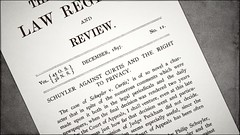Judge Noble Hand hints at the move from property to people
By Kristopher A. Nelson
in
April 2011
800 words / 4 min.
Tweet
Share
I have already discussed how Fourth Amendment protections and related “right to privacy” have shifted from a focus on property in the 19th century to one focused on people in the 20th. Judge Noble Hand’s 1897 law review article, Schuyler against Curtis and the Right to Privacy, gives some interesting hints about how American jurists contributed to this shift.
Please note that this post is from 2011. Evaluate with care and in light of later events.
I have already discussed how Fourth Amendment protections and related “right to privacy” have shifted from a focus on property in the 19th century to one focused on people in the 20th. Judge Noble Hand‘s 1897 law review article, Schuyler against Curtis and the Right to Privacy, gives some interesting hints about how American jurists contributed to this shift. He begins with a discussion of property and privacy:
A great argument of those who deny the existence of a right to privacy is always based on expressions found in some of the cases that an injunction will only issue to protect property. But such expressions are misleading. The confusion arises, it is believed, from a misconception as to what is the real legal nature of property.
Matter of Beekman Street, Hand points out, explained it like this: “The dividing line between property as a thing objectively appropriated by a person, and a personal right as subjectively belonging to a person, is not always entirely distinct.”
Hand goes on to emphasize that property is a “bundle of rights,” not a thing in particular:
In other words, the only scientific conception of property is not that of a horse, or a piece of land, or any object; but it is that of a bundle of legal rights–” indefinite in point of use, unrestricted in point of disposition, over a determinate thing,” as Austin puts it.
He goes on to discuss letters and that the right to prevent publication of a letter is not based on ownership of the physical thing, and yet the courts still protect it:
That equity will protect the single right to prevent publication in the case of letters shows conclusively that the courts recognize the absurdity of refusing to protect one right, because the person asking for relief has not others accompanying it, or because that right is not related to the ownership of a tangible object.
Another example Hand points to, where courts of equity have issued injunctions, are bodies of deceased relatives: “These cases certainly go to show that an invasion of a property right is not the test of equitable interference, for there is at common law no property in a dead body.”
Thus, Hand says, to argue (as some did, including Hadley) that there can be no invasion of privacy when no property is involved is “technical and conservative,” and does not match up with precedents such as rights in letters and the prevention of mutilation of the body of a dead relative. In other words, although Hand acknowledges that earlier common law emphasized that courts of equity (which grant injunctions) operated around property rights, this was no longer the case.
For additional support of the concept that legal rights go beyond property, he quotes Justice Patterson of the New York Supreme Court in Foley v. Phelps:
It is not a mere idle utterance, but a substantial legal principle, that wherever a real right is violated a real remedy is afforded by the law. A right to vote can in no sense be called a pure right of property; it is merely a personal right; yet who would now contend that a person obstructing a voter’s right or preventing his voting would not be, irrespective of any statutory enactment, liable, even if the candidate of the choice of the person thus obstructed was elected.
Additionally, Hand confronts criticisms that invasions of privacy cause “mental suffering,” which should not be recoverable as it does not involve any conception of “property.” He rebuts this by citing Justice Mitchell, in Larson v. Chase, who points to actions for false imprisonment, where the plaintiff was not touched, and yet could still recover, or recoveries for assault with no physical contact, where the plaintiff also recovered. Mitchell wrote–and Hand agreed–that “where the wrongful act constitutes an infringement on a legal right mental suffering may be recovered for if it is the direct, proximate and natural result of the wrongful act.”
Hand goes on to quote from Samuel D. Warren and Louis Brandeis‘ earlier law review article on the right to privacy and summarizes their pro-privacy approach. He approves their arguments, and asks “If, then, the protection of the privacy of the individual is practically so desirable, why should the law hesitate to give that protection?”
Related articles
- Confidentiality vs. privacy (inpropriapersona.com)
- What was the “right to privacy” in 1948? (inpropriapersona.com)

